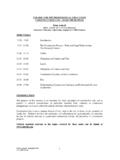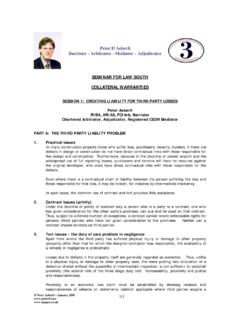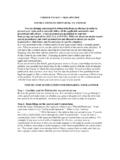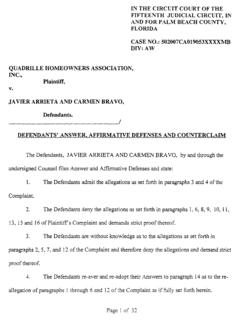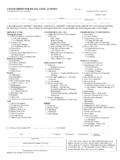Transcription of KINGS COLLEGE LONDON CENTRE OF ... - Peter …
1 Aeberli/ KINGS COLLEGE CENTRE of Construction Law 2009 Web site: -1- KINGS COLLEGE LONDON CENTRE OF CONSTRUCTION LAW AND MANAGEMENT PART D PRINCIPLES AND PRACTICE OF PLEADING Peter Aeberli RIBA ARIAS FCIArb Barrister, Chartered Arbitrator, Adjudicator, Registered CEDR Mediator A: INTRODUCTION 1. These notes consider the preparation of statements of case in civil proceedings in court, where they are commonly referred to as pleadings, and in arbitration where they may be referred to as case statements (Contrast the ICC Terms of Reference ).
2 2. While there is debate about the extent to which the principles of pleading in court are relevant to or appropriate in arbitration, the purpose of case statements is similar whatever the forum. Furthermore, at least in complex matters, there is a greater similarity of approach now that most of the technicalities of pleading in court have been swept away with the introduction of the Civil Procedure Rules (CPR). 3. The rules of pleading in court may also be applied by order in arbitration, in which case the pleadings are usually referred to as Particulars of Claim, Defence, Reply rather than Statement of Claim, Statement of Defence etc.
3 But in arbitral proceedings the parties are generally refereed to as claimant and respondent rather that, as in court proceedings, claimant and defendant (Contrast adjudication where the usual practice is to identify the parties as referring party and other party and both submit written statements.) 4. Purpose of case statements. Case statements have a number of important functions in arbitral proceedings. To identify the matters to be argued before and determined by the tribunal. To identify the limits of interlocutory orders such as discovery and interrogatories.
4 To limit the manner in which the parties can present their case at the To provide a permanent record of the matters raised in the 1 It is important to keep the case statements up to date by amendment where appropriate. Aeberli/ KINGS COLLEGE CENTRE of Construction Law 2009 Web site: -2- To record those matters that cannot be re-litigated between the 5. Causes of action, positive defences and material facts. An understanding of the legal basis of any claims advanced and positive defences relied upon is essential in the preparation of case statements.
5 Irrespective of the degree of formality required, a case statement should state all material facts relied upon by that party. The material facts are those that, if denied, must be proved by a party if it is to succeed in obtaining the relief claimed or in establishing a positive defence (an avoidance or, if it concerns a legal defect in the claimant's case a demurrer). A defence that goes beyond a mere denial (a traverse) of a fact alleged by the other party).4 The law only recognises certain factual situations as giving rise, if proved, to a relief or remedy or to a positive defence.
6 In the case of claims these factual situations are known as "causes of action," each cause of action consisting of a number of separate elements, each in turn governed by its own legal principles. There are numerous potential causes of action but, in the context of arbitral proceedings, the most frequently encountered causes of action are claims in debt and for breach of contract. For each cause of action there are a number of positive defences that can be relied on to defeat or reduce the claimant's entitlement, even if its case is otherwise 2 Court can look at these to seek if the award has completely disposed of the reference.
7 3 An arbitral award gives rise to an issue estoppel. Parties cannot in subsequent proceedings make allegations contrary to any precise point that was distinctly put in issue in the arbitration and decided against it, even if the object of the new proceedings is different from the arbitration. Consider Henderson v. Henderson (1843) 3 Hare 1000. Court can strike out as frivolous and vexatious any claim or defence which has clearly been decided in previous proceedings against the party raising it, or which might have been raised in previous proceedings in which the facts necessary to raise it have been decided against that party.
8 Consider also Res Judicata (cause of action estoppel). The whole legal rights/obligations are concluded by a Judgment both as to questions of fact and law (actual merger). The question is, was it open to the claimant to recover in the first action what it seeks to recover in the second. To decide, look at the pleadings. 4 Material facts relate to the cause of action or elements of the substantive defence on which reliance is placed. For example, the case of action in contract (contact, terms, breach, damage, causation, (also defences) misrepresentation, statement of fact, inducing contact, false, causation and damage or other relief.)
9 These are also important in award writing. Aeberli/ KINGS COLLEGE CENTRE of Construction Law 2009 Web site: -3-proved or admitted, and each of these in turn requires a number of material facts to be established. In identifying the material facts, consideration also should be given to any presumptions of law relevant to that claim or defence. A material fact that is presumed in law need not be alleged unless and until its non-occurrence is put in issue by the other party. Material facts can be distinguished from the evidence to be relied on to prove those facts.
10 Nevertheless, sufficient details (particulars) should be included about each material fact to enable the other party to know and prepare for the case it has to deal with (see AA1996, s. 33). In deciding the degree of detail to provide, the place of the case statement in the context of the proceedings as a whole, should also be considered. The material facts can also be distinguished from the legal consequences that flow from them. It is sometimes helpful, but seldom sufficient to identify to legal consequences on which reliance is placed.


